Perfumania Holdings, Inc. Bundle
Who Really Owns Perfumania Holdings, Inc.?
Ever wondered about the forces steering the ship at Perfumania Holdings, Inc., a major player in the fragrance industry? Understanding Perfumania Holdings, Inc. SWOT Analysis is just the beginning. This article pulls back the curtain on Perfumania's ownership, revealing the key players and their influence on this dynamic company. Uncover the evolution of Perfumania's ownership and its impact on strategic decisions.
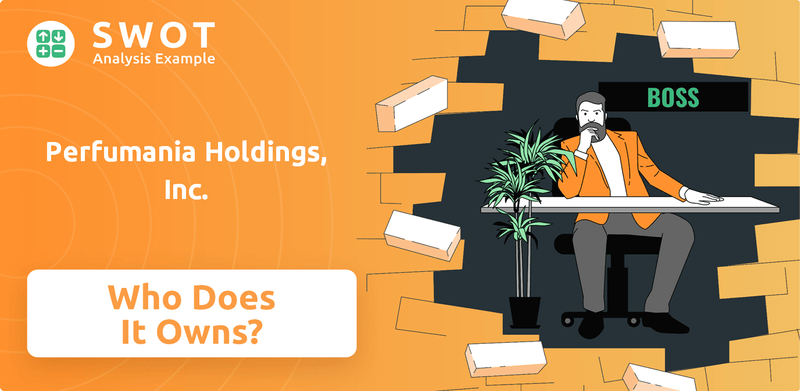
The ownership structure of Perfumania Holdings, Inc. is a critical factor in understanding its strategic direction and market positioning. From its founding to its current status, the Perfumania owner landscape has seen significant changes. This exploration will shed light on the Perfumania parent company, its investors, and the leadership shaping its future in a competitive global market. Knowing who owns Perfumania is key to assessing its long-term prospects.
Who Founded Perfumania Holdings, Inc.?
The story of Perfumania Holdings, Inc. began in 1984. While the exact initial ownership breakdown isn't fully detailed in recent public records, the early years were significantly shaped by key individuals and entities. Understanding the founders and early ownership provides crucial context for the company's later development and structure.
By 1996, brothers Rachmil and Ilia Lekach were major stockholders in Perfumania Inc., with Simon Falic, their brother-in-law, serving as CEO. This early structure highlights a strong family influence from the start, which played a key role in the company's early decisions and direction.
The early agreements and operations of Perfumania Holdings, Inc. were greatly influenced by these initial stakeholders. For instance, in 1996, the Lekaches and management considered taking Perfumania private at $6 per share, but Ilia Lekach's decision against participating in the buyout prevented the plan from moving forward.
The Lekach brothers and Simon Falic were central to Perfumania's early ownership and management.
Family members held significant stock and leadership roles, shaping early strategic decisions.
Key decisions, like the potential privatization in 1996, reflect the influence of major shareholders.
In August 2008, Perfumania Holdings, Inc. acquired Model Reorg, Inc., which included Quality King Fragrance, Scents of Worth, and Five Star Fragrance Company.
This acquisition helped position Perfumania as a vertically integrated specialty retailer and wholesale distributor.
The early ownership and management structure laid the groundwork for the company's future growth and development.
The founders and early owners of Perfumania Holdings, Inc. established a foundation that would shape the company's trajectory. The Lekach family's influence and strategic decisions, such as the 1996 potential buyout and the 2008 acquisition of Model Reorg, Inc., were critical in the company's early years. These decisions helped define Perfumania's corporate structure and direction. Further details about the company's history can be found in this article about Perfumania Holdings, Inc. Perfumania Holdings Inc..
- Perfumania's early ownership was heavily influenced by the Lekach family.
- Ilia Lekach held a significant 37% stake in 1996.
- Simon Falic served as CEO during this period.
- The acquisition of Model Reorg, Inc. in 2008 marked a significant shift towards vertical integration.
Perfumania Holdings, Inc. SWOT Analysis
- Complete SWOT Breakdown
- Fully Customizable
- Editable in Excel & Word
- Professional Formatting
- Investor-Ready Format
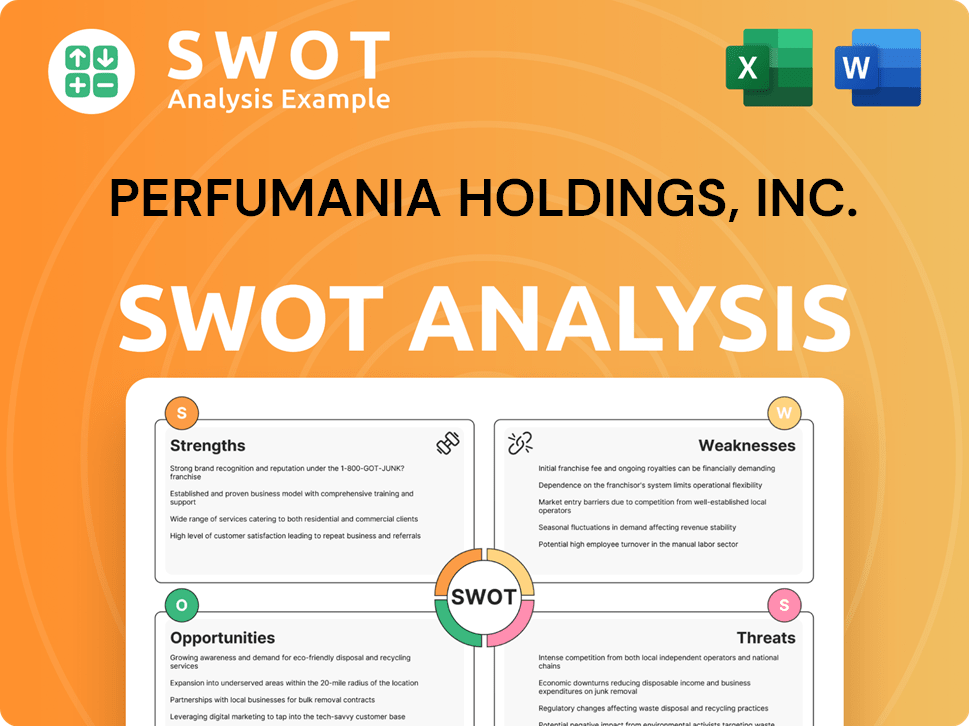
How Has Perfumania Holdings, Inc.’s Ownership Changed Over Time?
The ownership structure of Perfumania Holdings, Inc. has significantly evolved, especially in recent years. A crucial shift occurred when the company stopped filing with the SEC on October 16, 2017. This marked its transition from a publicly traded entity to a privately held one, a move that fundamentally altered its ownership dynamics. This change meant that the public investors no longer held shares, and the company's control moved to a more concentrated group of private owners.
A key event in Perfumania's history was the acquisition of Parlux Fragrances, Inc. in April 2012. This strategic move involved issuing roughly 6.014 million shares of common stock and approximately $62.1 million in cash to former Parlux Inc. shareholders. The shares given to Parlux Inc. shareholders represented about 40% of Perfumania's issued and outstanding common stock after the merger. This acquisition was a strategic move to create a larger, vertically integrated entity in the fragrance market, reshaping the company's structure and ownership.
| Event | Date | Impact on Ownership |
|---|---|---|
| Acquisition of Parlux Fragrances, Inc. | April 2012 | Issued approximately 6.014 million shares of common stock to former Parlux Inc. shareholders. |
| Transition to Private Company | October 16, 2017 | Ceased SEC filings, shifting from public to private ownership. |
| Nussdorf Family Ownership (as of May 2017) | May 2017 | Nussdorf family held approximately 50% of outstanding common stock and a majority of the debt. |
Before becoming private, the Nussdorf family held a significant stake in Perfumania Holdings, Inc. As of May 2017, they owned around 50% of the company's outstanding common stock and a majority of its debt. Glenn H. Nussdorf, in June 2017, beneficially owned 4,113,220 shares, a substantial portion of the then 15,493,763 outstanding shares. As of 2025, Perfumania Holdings, Inc. is privately held, meaning its ownership is not publicly traded. Further insights into the Revenue Streams & Business Model of Perfumania Holdings, Inc. can provide additional context.
The Nussdorf family held a significant stake before the company went private.
- Perfumania is now privately held.
- The acquisition of Parlux Fragrances, Inc. was a key strategic move.
- The company stopped filing with the SEC in 2017.
- The Nussdorf family owned approximately 50% of the company's outstanding common stock.
Perfumania Holdings, Inc. PESTLE Analysis
- Covers All 6 PESTLE Categories
- No Research Needed – Save Hours of Work
- Built by Experts, Trusted by Consultants
- Instant Download, Ready to Use
- 100% Editable, Fully Customizable
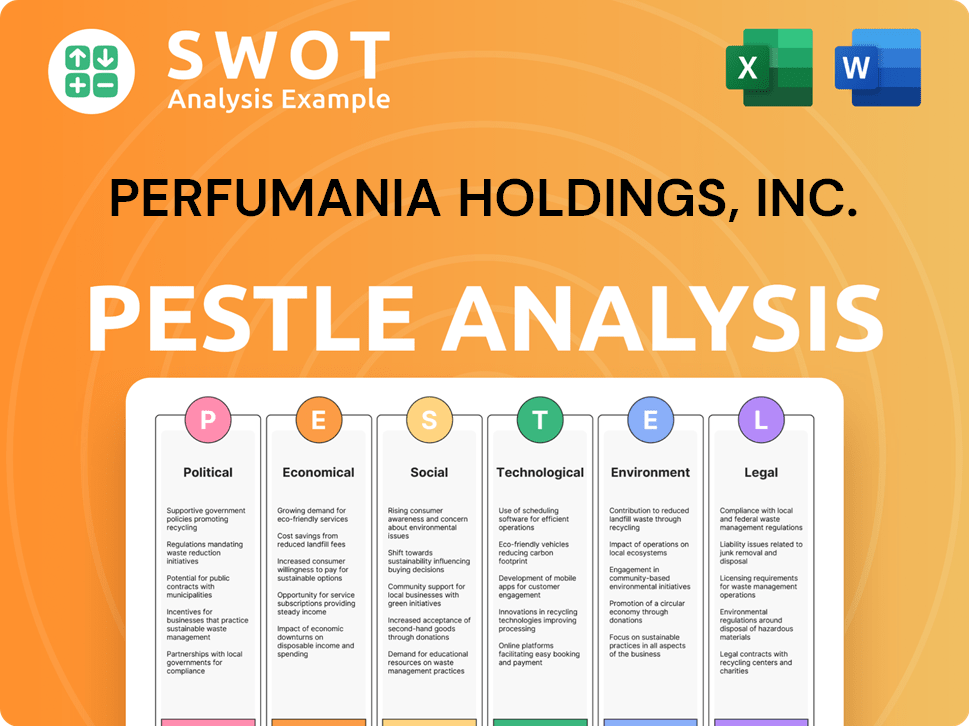
Who Sits on Perfumania Holdings, Inc.’s Board?
Before its delisting and privatization in 2017, the board of directors of Perfumania Holdings, Inc. played a crucial role in the company's governance. Following the acquisition of Parlux Fragrances, Inc. in April 2012, several Parlux directors joined Perfumania's board, reflecting the new ownership structure and strategic alignment. The Nussdorf family, as major shareholders, had considerable influence on the board and voting power, with Stephen Nussdorf serving as executive chairman and Glenn H. Nussdorf also on the board. Understanding the Marketing Strategy of Perfumania Holdings, Inc. can provide further insights into the company's evolution.
As Perfumania Holdings, Inc. transitioned to a private entity, the board's composition and voting power shifted. The voting structure and board composition are now governed by private agreements and corporate bylaws, differing from the public SEC regulations applicable to listed companies. In 2017, the company initiated recapitalization and filed for Chapter 11 bankruptcy, which led to the anticipated cancellation of current equity and an opportunity for current shareholders to receive consideration. This move aimed to establish Perfumania as a private company, fundamentally altering the dynamics of its board and voting power, with control shifting from public shareholders to private owners.
| Board Member | Role | Notes |
|---|---|---|
| Stephen Nussdorf | Executive Chairman | Major shareholder |
| Glenn H. Nussdorf | Board Member | Major shareholder |
| Frederick E. Purches | Former Board Member | Joined after Parlux acquisition |
The shift to private ownership significantly changed the corporate structure of Perfumania. As a private company, the details of the current board of directors, Perfumania owner, and voting power are not publicly disclosed in the same way they were when it was a public entity. This means information about the current Perfumania ownership and the leadership team is primarily available through private corporate documents rather than public filings. Understanding the current structure requires looking at private agreements and internal governance documents.
The board of directors and voting power have evolved significantly since Perfumania Holdings, Inc. became a private company.
- The Nussdorf family had considerable influence before privatization.
- Post-privatization, governance is governed by private agreements.
- Details on the current board are not publicly available.
- The shift impacts the Perfumania ownership structure.
Perfumania Holdings, Inc. Business Model Canvas
- Complete 9-Block Business Model Canvas
- Effortlessly Communicate Your Business Strategy
- Investor-Ready BMC Format
- 100% Editable and Customizable
- Clear and Structured Layout
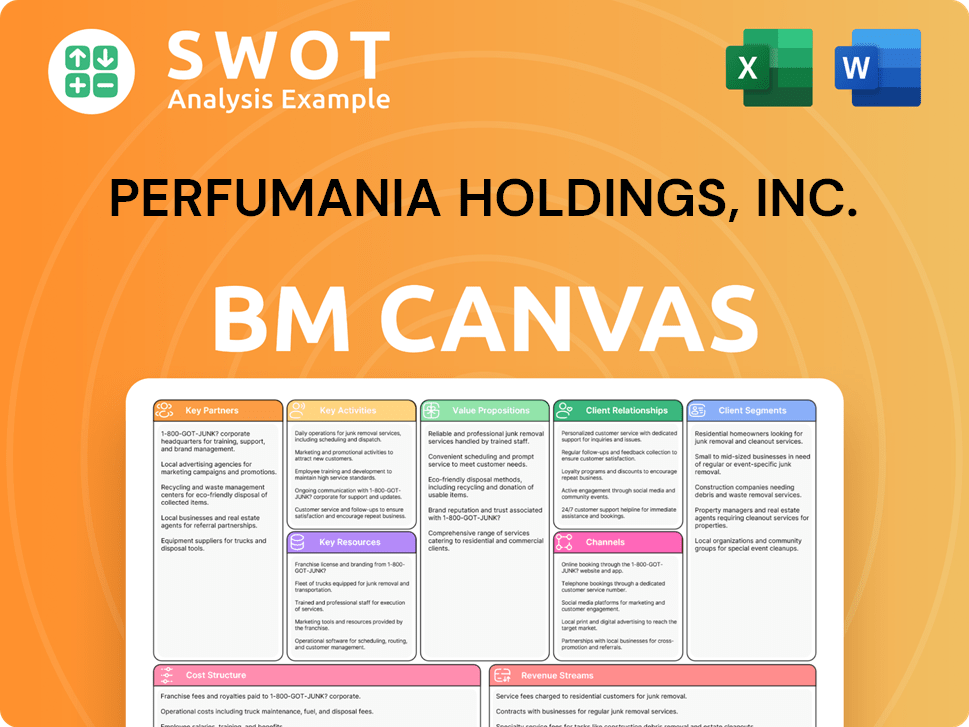
What Recent Changes Have Shaped Perfumania Holdings, Inc.’s Ownership Landscape?
The ownership structure of Perfumania Holdings, Inc. has significantly shifted in recent years. Following its delisting from NASDAQ in October 2017 due to its failure to file a 10-K with the SEC, the company transitioned to private ownership. This change meant that public filings detailing share buybacks, secondary offerings, or specific ownership percentages by institutional investors are no longer available. The company’s focus has since been on adapting to consumer shopping habits, particularly through increased investment in its e-commerce business.
In Q1 2024, Perfumania's e-commerce platform, Perfumania.com, generated $12.9 million in revenue, demonstrating the importance of its online presence. The global fragrance market is projected to reach $66.8 billion by 2029, indicating potential growth opportunities for Perfumania within its private structure. The shift to private ownership also included a reorganization and restructuring of the company's financial operations.
The Nussdorf family, who held a substantial portion of the company's stock and debt before privatization, likely remains a significant owner. Discussions about restructuring and capital structure, possibly involving further family investment, suggest their continued involvement. To understand the competitive landscape, consider exploring the Competitors Landscape of Perfumania Holdings, Inc.. The company's strategy under private ownership will likely prioritize profitability and adaptation to market trends, such as the growth in e-commerce, which saw online retail sales in the U.S. reach $1.1 trillion in 2023.
Perfumania Holdings, Inc. transitioned from a public to a private company in October 2017. This change resulted in the suspension of trading of its common stock on Nasdaq and subsequent deregistration with the SEC. The move to private ownership altered the availability of detailed public filings.
The company has adapted to changing consumer behaviors by investing in its e-commerce platform. In Q1 2024, Perfumania.com generated $12.9 million in revenue. This strategic shift aligns with the growing trend of online retail.
The Nussdorf family, who held a significant stake before privatization, is likely still a major owner. Discussions about restructuring indicate their continued involvement in the company's operations and capital structure. Details about the current ownership are not publicly available.
The company's strategy will likely focus on profitability and adapting to market trends. The growth of the global fragrance market, projected to reach $66.8 billion by 2029, presents opportunities. Perfumania's focus on e-commerce positions it well for future growth.
Perfumania Holdings, Inc. Porter's Five Forces Analysis
- Covers All 5 Competitive Forces in Detail
- Structured for Consultants, Students, and Founders
- 100% Editable in Microsoft Word & Excel
- Instant Digital Download – Use Immediately
- Compatible with Mac & PC – Fully Unlocked
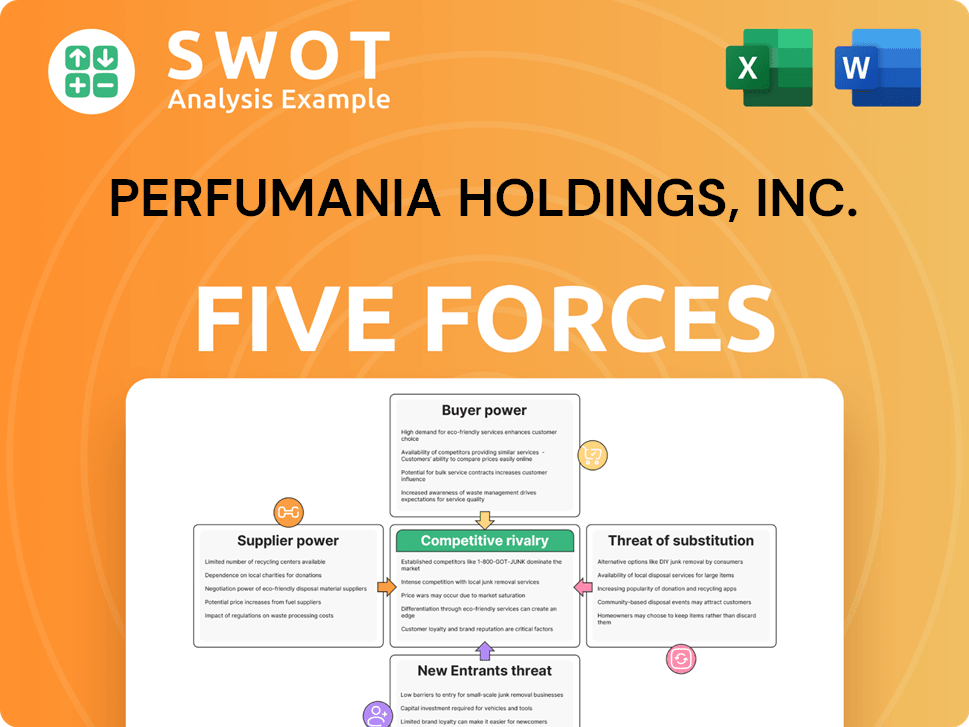
Related Blogs
- What are Mission Vision & Core Values of Perfumania Holdings, Inc. Company?
- What is Competitive Landscape of Perfumania Holdings, Inc. Company?
- What is Growth Strategy and Future Prospects of Perfumania Holdings, Inc. Company?
- How Does Perfumania Holdings, Inc. Company Work?
- What is Sales and Marketing Strategy of Perfumania Holdings, Inc. Company?
- What is Brief History of Perfumania Holdings, Inc. Company?
- What is Customer Demographics and Target Market of Perfumania Holdings, Inc. Company?
Disclaimer
All information, articles, and product details provided on this website are for general informational and educational purposes only. We do not claim any ownership over, nor do we intend to infringe upon, any trademarks, copyrights, logos, brand names, or other intellectual property mentioned or depicted on this site. Such intellectual property remains the property of its respective owners, and any references here are made solely for identification or informational purposes, without implying any affiliation, endorsement, or partnership.
We make no representations or warranties, express or implied, regarding the accuracy, completeness, or suitability of any content or products presented. Nothing on this website should be construed as legal, tax, investment, financial, medical, or other professional advice. In addition, no part of this site—including articles or product references—constitutes a solicitation, recommendation, endorsement, advertisement, or offer to buy or sell any securities, franchises, or other financial instruments, particularly in jurisdictions where such activity would be unlawful.
All content is of a general nature and may not address the specific circumstances of any individual or entity. It is not a substitute for professional advice or services. Any actions you take based on the information provided here are strictly at your own risk. You accept full responsibility for any decisions or outcomes arising from your use of this website and agree to release us from any liability in connection with your use of, or reliance upon, the content or products found herein.